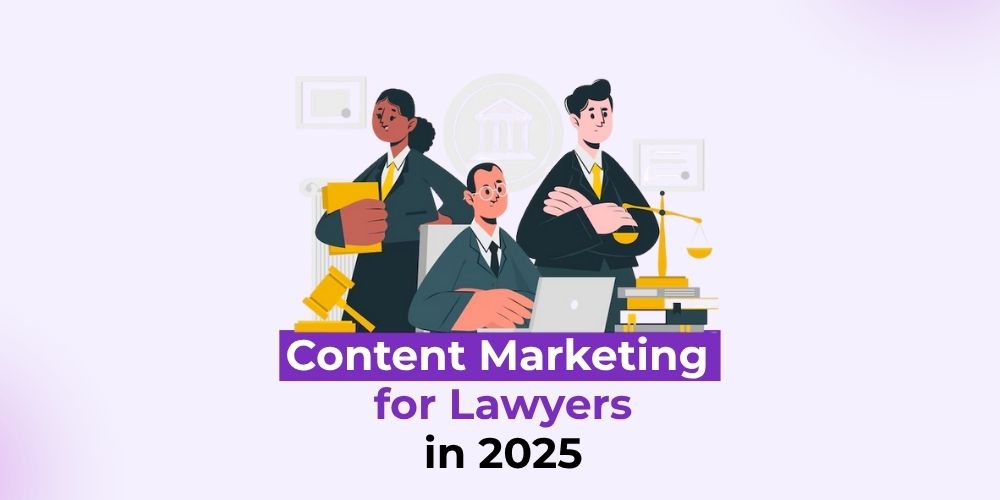The law is changing. So is marketing. Clients no longer discover lawyers through the yellow pages or radio jingles.
In 2025, content marketing for lawyers has become the gold standard for visibility, trust, and lead generation. The legal digital marketing services landscape is crowded and competitive, especially with the rise of legal tech disruptors and DIY platforms.
To stay visible and relevant, lawyers need more than just a website, they need to educate, engage, and establish authority through consistent, strategic content.
Over the past decade, we’ve helped law firms in estate planning, criminal defense, immigration, and corporate law embrace digital-first thinking.
We’ve witnessed firsthand how well-executed content marketing drives traffic, increases consultations, and builds trust.
In this guide, we’ll explore everything you need to master content marketing for lawyers in 2025, from creating buyer personas to distributing content with measurable ROI.
Lawyers Need to Know About Content Marketing
Content marketing for lawyers is all about consistently sharing helpful and relevant information. The goal is to connect with the right audience, build trust over time, and position your legal services as the go-to solution when they need help.
This isn’t traditional advertising; you’re not pushing your services but pulling clients in by offering solutions, answers, and insights.
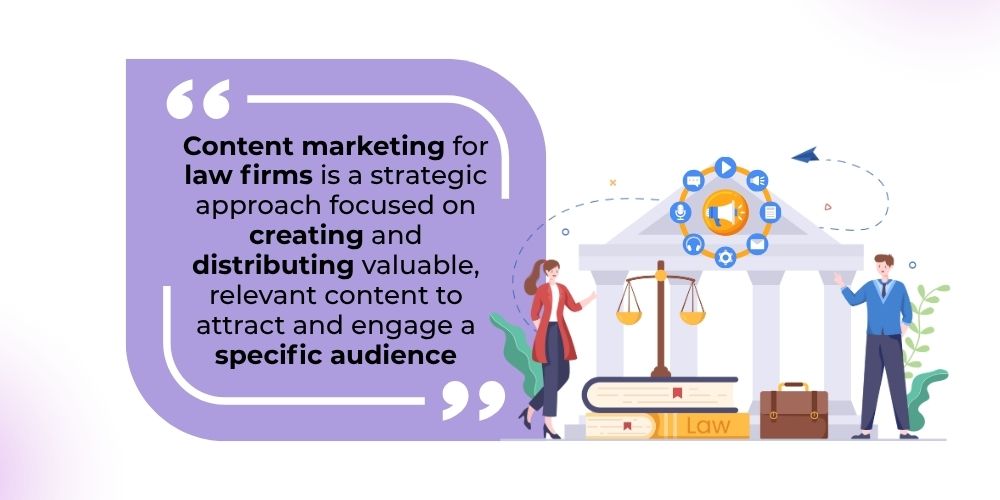
Unlike billboards or paid ads that fade the moment the campaign ends, content marketing builds equity over time.
A well-written blog on “How to Navigate DUI Charges in California” can drive traffic for years. With one of our clients, a criminal defense attorney in Los Angeles, a single blog post optimized for local SEO continues to bring in leads five years later.
Effective legal content includes:
- Blog posts answering frequently asked questions
- Case studies showing how legal problems were resolved
- Explainer videos breaking down complex laws
- Whitepapers discussing new legislation
We’ve found that content that simplifies legal jargon and genuinely helps clients builds trust quickly. With our real estate law client in New York, we created a “Legal Basics for First-Time Buyers” content hub that increased their organic site visits by 300% in eight months.
Why Lawyers Need Content Marketing
Google’s algorithms are smarter than ever in 2025. They reward content that demonstrates Experience, Expertise, Authoritativeness, and Trust (E-E-A-T).
For law firms, that means every blog, FAQ, or video must show legal expertise and be backed by credible citations.
Today, most potential clients educate themselves before contacting a lawyer. They search for answers to questions like “What happens after a workplace injury?” or “How much does a divorce lawyer cost in Miami?”
If your firm doesn’t show up in those searches, you’re losing clients to firms that invest in local SEO service for law firms.
Legal tech companies have also increased the pressure. Platforms offering low-cost, templated solutions have changed consumer expectations.
But these platforms can’t offer the depth, personalization, or nuanced strategy that a seasoned attorney can. Content marketing helps law firms differentiate by showcasing that depth.
One of our corporate law clients used a mix of blogs, LinkedIn posts, and whitepapers to position themselves as thought leaders in startup law.
As a result, they were invited to speak at legal tech conferences and grew their lead funnel by 170% within a year.
Understanding Your Audience: Law Firm Buyer Personas
Before creating content, know who you’re speaking to. Buyer personas help define your ideal client’s demographics, concerns, goals, and behaviors.
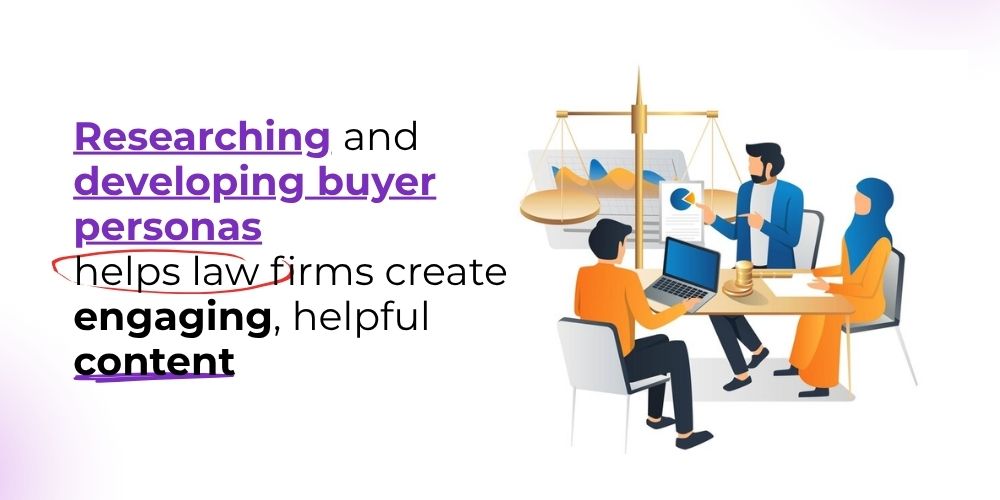
For B2C practices like family law or personal injury, content should speak emotionally, offering reassurance and clarity. B2B firms, on the other hand, need content that demonstrates ROI, risk mitigation, and legal foresight.
Effective persona insights include:
- Age, gender, income bracket
- Common questions or pain points
- Preferred platforms (Google, LinkedIn, YouTube)
- Search behaviors (“hire DUI lawyer Chicago” vs. “should I plead guilty”)
We helped an immigration law firm craft unique content for two personas: working professionals and university students. Each persona had separate landing pages, email sequences, and blog paths, leading to a 220% increase in contact form submissions.
Crafting a Content Strategy for Your Law Firm
An effective content strategy begins with setting clear goals. Are you aiming to increase site traffic, grow your email list, rank higher on Google, or drive consultation bookings?
Core content pillars could include:
- Personal injury law: accident recovery, insurance claims
- Estate planning: wills, trusts, probate
- Business law: incorporation, contracts, compliance
Each pillar should have content mapped to the client journey: awareness (“What is medical malpractice?”), consideration (“How to choose a malpractice lawyer”), and decision (“Schedule a free consultation”).
We conducted a content audit for a family law firm in Austin and found that their top competitor published three times more content monthly.
By benchmarking their content volume and adjusting formats (adding videos and case studies), we increased their time-on-site by 67%.
Legal Blogging: Still King in 2025
Despite the explosion of TikTok and AI chat tools, blogging remains a cornerstone of law firm marketing strategies. Google still prioritizes fresh, relevant written content when ranking pages.
We saw this firsthand when optimizing a bankruptcy lawyer’s blog. By adding schema markup, better headings, and internal links, their organic traffic doubled in six months.
Legal blog post ideas that perform well:
- FAQ blogs (“What to do after a car accident?”)
- Explainers (“Understanding Non-Compete Clauses in Texas”)
- Client stories (with consent)
- Updates on legal reforms
- Checklist for effective legal blogs:
- Strong H1 and H2 headings
- Short, clear paragraphs
- Internal links to service pages
- External links to legal authorities
- CTA (“Book a free consult”)
Other High-Impact Content Types for Lawyers
Modern content marketing isn’t limited to blogs. Lawyers who diversify their formats reach more people in more ways.
Winning formats include:
- Video: Short legal tips on YouTube or TikTok. A Florida personal injury firm we work with saw 12K+ views on a 60-second video explaining “What to do after a slip and fall.”
- Podcasts: Share legal insights or interview peers. A solo family lawyer used a weekly Q&A podcast to double their email subscribers.
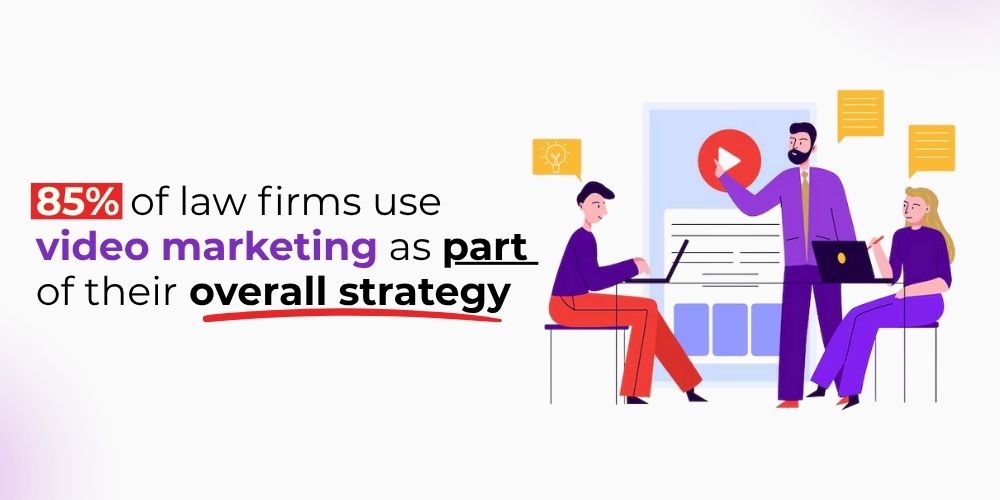
- Whitepapers/eBooks: Lead magnets work. An estate planning firm used a downloadable “Retirement and Probate Guide” to generate 800+ leads.
- Social Media: LinkedIn works best for corporate law; Instagram or TikTok for family or personal injury law. A criminal lawyer we work with grew their TikTok to 20K followers by simplifying legal myths.
- Email Newsletters: Keep past and potential clients engaged.
SEO for Legal Content
Strong content means nothing without visibility. SEO for law firms requires an intentional approach.
Start with keyword research using tools like:
- Ahrefs (paid)
- Ubersuggest (freemium)
- Google Keyword Planner (free)
Key SEO tactics include:
- On-page: keyword-rich headings, metadata, image alt-text
- Local SEO: add city names in titles (“Divorce Lawyer Dallas TX”)
- Technical SEO: optimize load times, mobile responsiveness, add schema
- Link-building: guest blogging, citations on law directories
We helped a San Francisco business law firm climb to Page 1 on Google for “startup lawyer SF” using SurferSEO to optimize blogs and build topic clusters.
Compliance and Ethics in Legal Content Marketing
Legal content must follow strict guidelines. ABA and state bar rules prohibit misleading claims and require disclaimers.
Key compliance checks include:
- Never promise outcomes
- Add “not legal advice” disclaimers
- Avoid sensationalism
- Fact-check with current case law
When we built content for an employment law firm, we included citations to Department of Labor policies and used a legal disclaimer plugin on their site. This avoided compliance pitfalls while boosting credibility.
Distribution and Promotion
Creating great content isn’t enough. It must reach the right people.
Promotion strategies:
- Organic: SEO, newsletters, social media posts
- Paid: Google Ads (for high-intent keywords), Facebook, LinkedIn
- Retargeting: Use Facebook Pixel or Google tags to follow up with visitors
A probate attorney client saw an 8x return on ad spend after we launched a retargeting campaign offering a free eBook to site visitors.
Measuring Success: Analytics and KPIs
Measure what matters.
Track KPIs like:
- Organic traffic
- Keyword rankings
- Time on page
- Conversion rate (form fills, calls, chats)
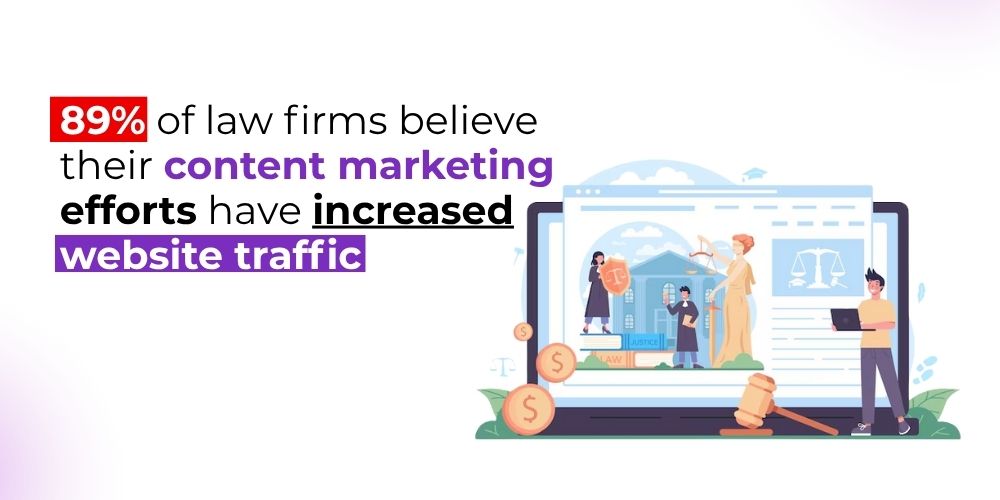
Recommended tools:
- Google Analytics 4
- Google Search Console
- SEMrush
We helped a solo immigration lawyer integrate GA4 and set up event tracking. Within three months, they discovered that blog readers who downloaded a checklist were 3x more likely to book a call.
Content Marketing Tools for Lawyers
Recommended tools include:
- CMS: WordPress, Webflow (easy for SEO)
- SEO Tools: Ahrefs, SurferSEO, Clearscope
- AI Writing: Tools like Jasper (with manual compliance reviews)
- Content Planning: Notion, Trello, and ClickUp for calendars and status
We use Notion at The Meta Future to manage content across 25+ legal clients. It keeps strategy, execution, and publishing organized.
Real-World Examples of Lawyers Doing It Right
- Immigration Lawyer (Houston): Created a multilingual blog and video series answering visa questions. Result: 3x traffic, partnerships with international schools.
- Startup Law Firm (NYC): Hosts LinkedIn Lives with VCs and founders. Built thought leadership and inbound referrals from investor circles.
- Criminal Defense (LA): TikTok series busting legal myths. Went viral and brought in weekly consultations from younger audiences.
Common Mistakes Lawyers Make in Content Marketing
- Publishing once a month or less
- Ignoring mobile optimization
- Writing overly complex content for peers instead of clients
- Forgetting CTAs
One firm we audited had blogs that ranked well but didn’t convert. Why? No forms, no CTAs, and no clear next steps.
Conclusion
In 2025, content marketing for lawyers is non-negotiable. It builds visibility, positions you as a thought leader, and turns browsers into buyers.
Start with one high-value asset: a downloadable SEO checklist, a blog series, or a short video answering FAQs.
When we help law firms grow, we don’t guess, we plan, publish, optimize, and scale. Whether you’re a solo attorney or a firm of fifty, content is your strongest ally for growth.
Ready to lead in 2025? Start your content marketing journey today, only with The Meta Future.

